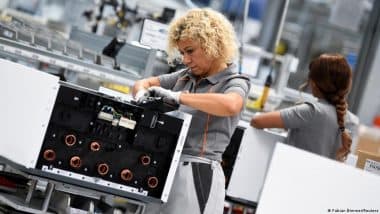German lawmakers criticized the development and warned of potential negative impacts on the German economy. The demand for heat pumps is expected to increase as Germany seeks to reduce the use of fossil fuels in housing.German Economy Minister Robert Habeck said on Wednesday that the sale of a domestic heat pump manufacturer to US rival Carrier Global showed that Germany remained attractive to investors, but added that he would closely examine the agreement.
Also Read | Delhi Shocker: Six-Year-Old Girl Sexually Assaulted by School Cab Driver for One Year; Accused Arrested.
What did Habeck say about the sale?
"The planned sale of the Viessman division shows that climate protection technologies are the future," Habeck said in a statement.
He added that the sale shows that German companies attract a substantial amount of capital and that the heat pump market attracts investors.
The minister said that the government's "energy and heat transition" measures set the course for "great value and growth."
Nonetheless, Habeck stressed that it is important that "the advantages of our energy policy and the profits that are generated continue to benefit Germany."
He said that the government was in talks with both Viessman and Carrier Global to ensure that the project serves the German economy.
Carrier Global said on Tuesday that it had agreed to purchase German firm Viessman's "climate solutions" business for $12 billion (€10.9 billion).
The deal also makes Viessman one of the biggest shareholders in Carrier. The German firm's CEO, Max Viessmann, is set to join Carrier's board of directors.
Energy policy meets criticism from coalition partners, opposition
Meanwhile, German politicians criticized the development and warned of potential negative impacts on the German economy.
Bijan Djir-Sarai, general secretary of the business-focused Free Democrats (FDP), told the Handelsblatt financial daily that the sale showed how a "hasty and complicated" energy transition could have a "negative impact on the German economy."
The FDP is in coalition with Chancellor Olaf Scholz's center-left Social Democrats (SPD) and the environmentalist Greens, of which Habeck is a member. Energy policy has been a major point of contention among the coalition partners.
Julia Klöckner, economic spokeswoman for the opposition conservative bloc (CDU/CSU), told the Funke media group that it was a "shame" that a German family-owned business has ended up in US hands.
Klöckner said that Germany's planned ban on gas boilers made takeovers of German companies more attractive to foreign investors. She said that strong partnerships were needed for domestic industry to remain competitive.
In comments to the RND newspaper group, CDU lawmaker Jens Spahn accused the government of putting pressure on manufacturers to step up production to compete with Asian firms.
"Apparently foreign investors are needed for that," Spahn said, arguing that government policies were causing a "sell-of of the German heat pump."
The demand for heat pumps is expected to increase due to measures aiming to reduce the use of fossil fuels in housing. The German Economy Ministry has proposed a ban on the installation of new oil and gas-powered boilers starting in 2024.
sdi/wd (AFP, AP, dpa)
While you're here: Every Tuesday, DW editors round up what is happening in German politics and society. You can sign up here for the weekly email newsletter Berlin Briefing.
(The above story first appeared on LatestLY on Apr 26, 2023 05:50 PM IST. For more news and updates on politics, world, sports, entertainment and lifestyle, log on to our website latestly.com).













 Quickly
Quickly




















